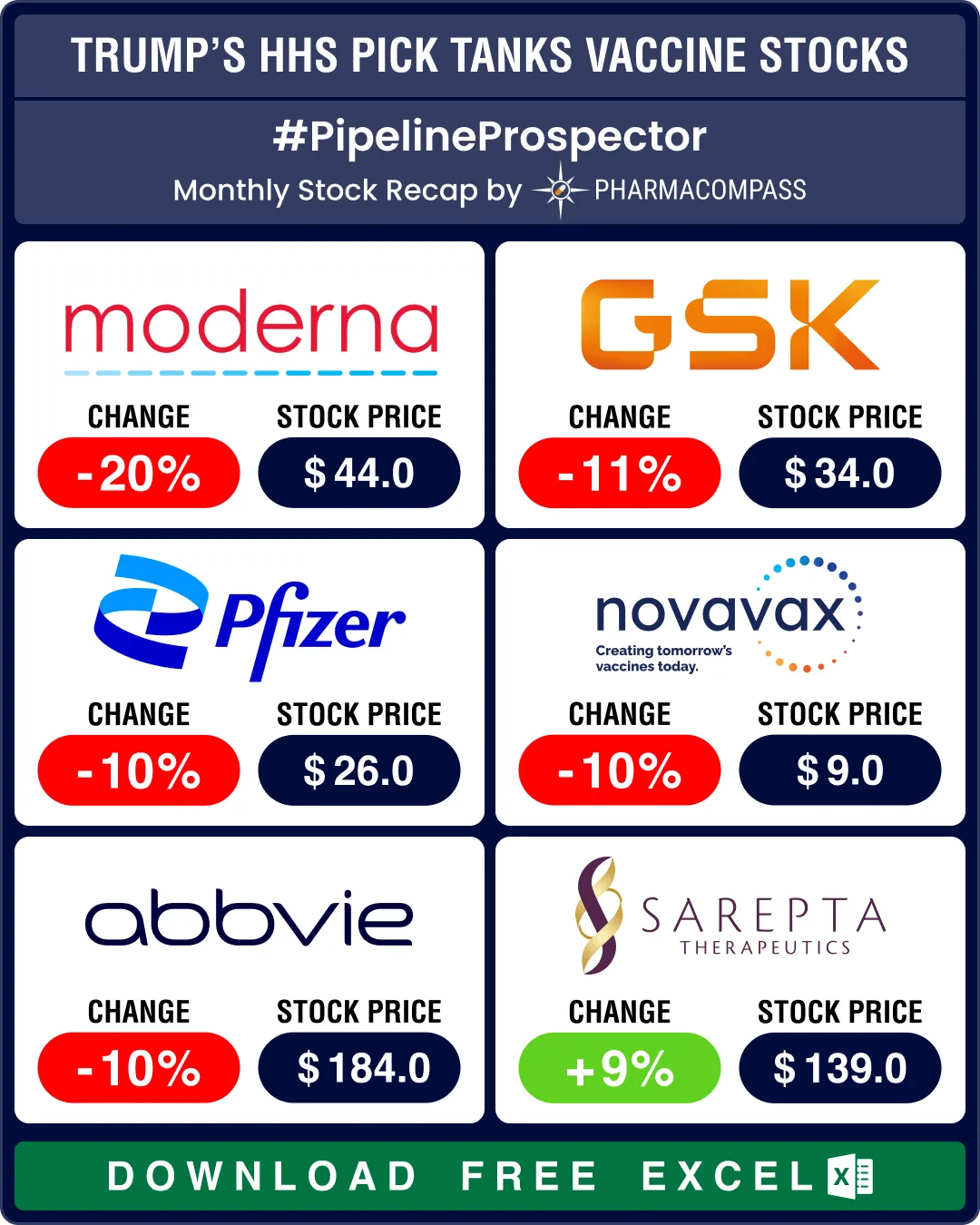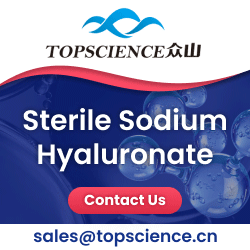
By PharmaCompass
2024-12-05
Impressions: 6773
In November, the markets responded to US President-elect Donald Trump’s picks, particularly the choice of Robert F. Kennedy Jr. to lead the Department of Health and Human Services (HHS). Given that RFK Jr. is known as an anti-vaccine activist, stocks of Pfizer, Novavax, and Moderna dipped by 10 percent, 10 percent and 20 percent respectively during the month. Vaccine makers in Europe, such as GSK and Bavarian Nordic, also met a similar fate, and their stocks were down by 11 percent and 9 percent respectively for the month.
Overall, the Nasdaq Biotechnology Index (NBI) fell by 0.11 percent — from 4,650.07 to 4,644.81 in November. The SPDR S&P Biotech ETF (XBI) rebounded 2.67 percent from 97.03 to 99.62, while the S&P Biotechnology Select Industry Index (SPSIBI) ended higher by 2.68 percent — from 7,561.3 to 7,763.7.
Access the Pipeline Prospector Dashboard for November 2024 Newsmakers (Free Excel)
Pharma giants Novartis, Merck, Roche spark November’s billion-dollar deal bonanza
Swiss drugmakers — Novartis and Roche — dominated this month’s dealmaking landscape. Novartis acquired Kate Therapeutics for up to US$ 1.1 billion, targeting Duchenne muscular dystrophy and other neuromuscular diseases.
Novartis also committed US$ 150 million upfront to computational drug discovery firm Schrödinger (stock up 21 percent) in a research collaboration and license deal that has the potential to reach US$ 2.45 billion.
In yet another deal, Novartis committed US$ 745 million to Ratio Therapeutics for a radiotherapeutic candidate being developed to cure cancer. The company CEO Vas Narasimhan plans to keep pursuing strategic acquisitions under US$ 5 billion. Over the last five years, the company has spent approximately US$ 19.4 billion in deals.
Roche entered into a US$ 1.8 billion deal with Flare Therapeutics to target previously undrugged cancer transcription factors (i.e. proteins that regulate the transcription of genes). It also acquired Poseida Therapeutics for up to US$ 1.5 billion. The acquisition of Poseida (stock up 350 percent) brings innovative CAR-T programs for solid tumors and autoimmune diseases within its fold.
American drugmaker Sarepta Therapeutics (stock up 9 percent) signed a landmark deal with Arrowhead Pharmaceuticals (stock up 35 percent), valued at up to US$ 11.4 billion. It includes an upfront payment of US$ 500 million, an equity investment of US$ 325 million, and worldwide rights to seven RNA-based programs (four clinical, three preclinical). Milestone payments and royalties make up for US$ 10 billion. The collaboration “affords multiple potential blockbuster opportunities” across skeletal muscle, cardiac, and central nervous system disorders.
BioNTech (stock up 5 percent) is buying Chinese biotech firm Biotheus for up to US$ 950 million. And Merck signed a US$ 3.3 billion deal with China’s LaNova Medicines for LM-299, a bispecific antibody. Both these deals manifest growing interest in PD-(L)1xVEGF bispecific antibodies, intended for treating solid tumors.
Access the Pipeline Prospector Dashboard for November 2024 Newsmakers (Free Excel)
Journey Medical, UCB secure FDA nods for skin treatments; BridgeBio’s Attruby to take on Pfizer’s Vyndaqel
BridgeBio Pharma (stock up 8 percent) made an "improbable comeback" after a disastrous trial failure and two rounds of layoffs. It clinched FDA’s nod for Attruby, the first new treatment for transthyretin amyloid cardiomyopathy (a rare heart disease) in over five years. With this potentially transforming treatment option, BridgeBio gains a foothold in a lucrative market dominated by Pfizer’s blockbuster Vyndaqel. Attruby is expected to bring in US$ 2.5 billion in peak sales by 2035.
In dermatology, Journey Medical secured approval for Emrosi, an innovative oral antibiotic developed along with Dr. Reddy’s Laboratories for treating rosacea (an inflammatory skin condition). UCB’s Bimzelx received its fifth FDA approval in just over a year, becoming the first therapy to selectively inhibit two proteins — IL-17A and IL-17F — to treat hidradenitis suppurativa, a painful skin condition. And Johnson & Johnson’s oral drug icotrokinra achieved successful phase 3 results in moderate-to-severe plaque psoriasis (a skin condition where inflamed and scaly plaques appear on the skin).
In oncology and hematology, Syndax Pharmaceuticals’ Revuforj became the first menin inhibitor approved for relapsed or refractory acute leukemia. And Azurity Pharmaceuticals bagged an FDA nod for Danziten (nilotinib), a formulation of Novartis’ blockbuster drug Tasigna that allows patients with chronic myeloid leukemia (a blood cancer that begins with the bone marrow) to take their medication without fasting.
Autolus Therapeutics achieved its first FDA approval. Its med Aucatzyl for relapsed or refractory B-cell precursor acute lymphoblastic leukemia became the first FDA-approved CAR-T therapy without the agency’s drug safety program requirement, known as Risk Evaluation and Mitigation Strategies (REMS). Its REMS-free status could simplify its administration and increase its adoption among treatment centers.
Other significant nods include PTC Therapeutics’ Kebilidi – the first-ever FDA approval for a gene therapy directly administered to the brain and, Jazz Pharmaceuticals’ Ziihera for HER2-positive biliary tract cancer.
Access the Pipeline Prospector Dashboard for November 2024 Newsmakers (Free Excel)
Novo, AbbVie, Cassava face trial failures; FDA rejects Lexicon, Applied Therapeutics’ drugs
The US Food and Drug Administration’s advisory committee rejected Lexicon Pharmaceuticals’ diabetes drug Zynquista, citing diabetic ketoacidosis risks for type 1 diabetes patients with chronic kidney disease. In 2023, the drug had been approved for heart failure.
Applied Therapeutics saw the FDA reject its galactosemia drug, govorestat, dampening hopes for its first commercial product.
Cassava Sciences’ Alzheimer’s drug simufilam, once hailed as a potential breakthrough, missed pivotal trial endpoints amid ongoing fraud investigations involving neuroscientist Hoau-Yan Wang. Critics questioned the validity of the preclinical and early clinical data, suggesting that the promising results may have been overstated or fabricated.
Lexicon, Cassava, and Applied Therapeutics’ stocks plummeted 40 percent, 85 percent, and 78 percent, respectively.
AbbVie (stock down 10 percent) faced a significant blow as emraclidine, the centerpiece of its US$ 8.7 billion Cerevel acquisition, failed to meet primary endpoints in two pivotal phase 2 schizophrenia trials.
Novo Nordisk (stock down 5 percent) decided to discontinue kidney disease drug ocedurenone after a phase 3 trial failure, resulting in an impairment loss of approximately US$ 816.5 million.
Access the Pipeline Prospector Dashboard for November 2024 Newsmakers (Free Excel)
Our view
In the third quarter of 2024, Pfizer recorded a 32 percent increase in its year-on-year sales, ending a six-quarter streak where either Eli Lilly or Novo Nordisk were leading in revenue growth. Despite this feat, Pfizer’s stock took a beating on the bourses due to RFK Jr’s nomination to head the HHS.
Trump has nominated another controversial personality — Johns Hopkins’ surgeon Martin Makary — to head the FDA. Makary has been a critic of Covid-19 mandates such as masking and vaccines. While the markets didn’t react to his nomination, going forward, we foresee political headwinds causing some turbulence in the biopharma industry.
Access the Pipeline Prospector Dashboard for November 2024 Newsmakers (Free Excel)
Pharma & Biotech Newsmakers in November 2024
| Company | Country | Currency | Market Cap (Bn) | Change In Market Cap (M) | Stock Price | Change In Price |
|---|
The PharmaCompass Newsletter – Sign Up, Stay Ahead
Feedback, help us to improve. Click here
Image Credit : TRUMP’S HHS PICK TANKS VACCINE STOCKS by PharmaCompass license under CC BY 2.0
“ The article is based on the information available in public and which the author believes to be true. The author is not disseminating any information, which the author believes or knows, is confidential or in conflict with the privacy of any person. The views expressed or information supplied through this article is mere opinion and observation of the author. The author does not intend to defame, insult or, cause loss or damage to anyone, in any manner, through this article.”







